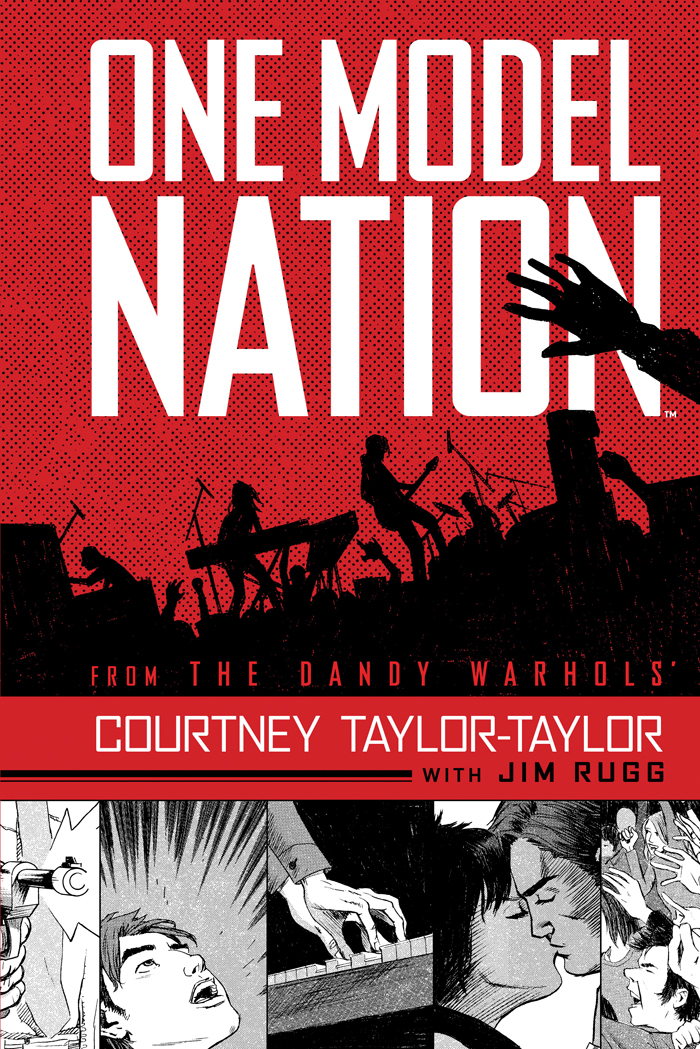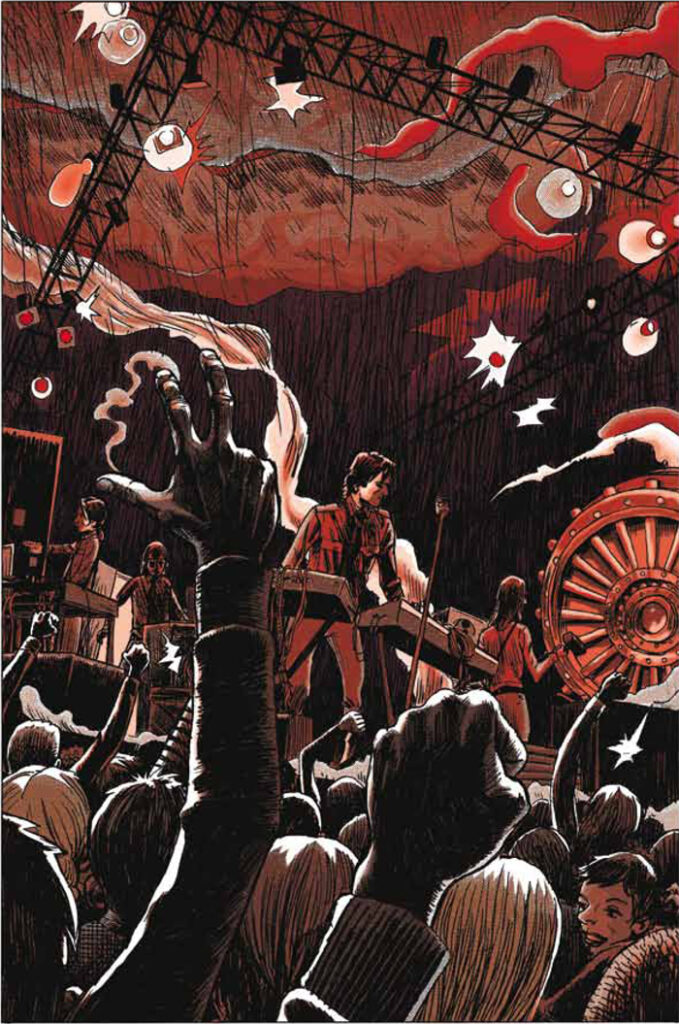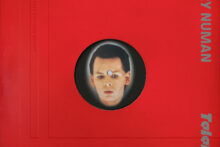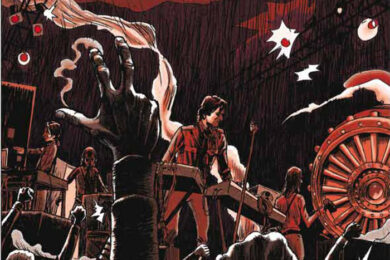In One Model Nation, The Dandy Warhols’ frontman Courtney Taylor-Taylor gives us a glimpse of the mysterious art-rock band of the novel’s title, who disappeared at the end of the 70s without a trace. Illustrated by Jim Rugg, Titan Books has published the first hardback edition featuring sketches, director’s commentary, deleted scenes, a foreword by Michael Allred, and The Story of The Band, thoughts on the Red Army Faction and an afterword from Taylor-Taylor.
One Model Nation are four young men, in epaulettes and skinny ties, intensely focused on their music. Careful to keep themselves out of the public eye, they only really leave their studio, Klang Klang, to play covert festivals around Germany. But tensions with the police are increasingly out of control at these events and the band consider breaking their silence to the press in an attempt to disassociate themselves from suspected terrorist activity. Their doubts about this are confirmed when they get dragged into some of the Red Army Faction’s exploits as Sebastian, OMN’s even-more-reclusive musical genius, has become romantically involved with Ulrike Meinhof.
Perhaps for obvious reasons, apart from the Luke Haines band and a handful of films, the Baader-Meinhof gang have had little impact on mainstream Western popular culture until recent years. However, Courtney has set the story in 1977, which in real life is the year after Ulrike Meinhof allegedly committed suicide and the year the extremely supple Andreas Baader managed to shoot himself in the base of the neck so the bullet exited via his forehead. Several others were to die in Stammheim Prison on the same day. Yet the real-life scene of Andreas Baader’s escape from custody at the German Central Institute For Social Issues library has been lifted straight out of 1970 into the comic. And to further confuse the issue, the music that pervades this graphic novel – a coke-paranoid Bowie talks to the band about coming to record in Berlin, Klaus Nomi and Nina Hagen make appearances, and band members discuss the Sex Pistols and Television – is pure 1977, and as such is somewhat disorientating.
The story is, of course, a fiction, though one can’t help feeling that it would’ve worked better had it been set in the early 70s, concurrent with historical Red Army Faction activity and an excellent wave of indigenous, radical German music. [The krautrock producer Uwe Nettlebeck was, by all accounts, a sympathiser of the RAF’s cause and he was accused of harbouring members at the group at a farmhouse near Wümme where Faust were living and recording. The band were woken up at gun point during an army raid one particular morning but have always maintained that they were unaware of the connection.]
I asked Courtney about the prison break scene and the choice of setting being largely musical. “Yeah absolutely correct. I was chilled to the bone as a teenager by that scene. And I guess I don’t know or really care why but I’ve always wanted a Star Wars or something set in it. There is such feeling in the style and sound and ethic and I really am concerned primarily with message and feeling that all else must serve them utterly. Me included.” Star Wars was also released in 1977.
Feature continues after illustration
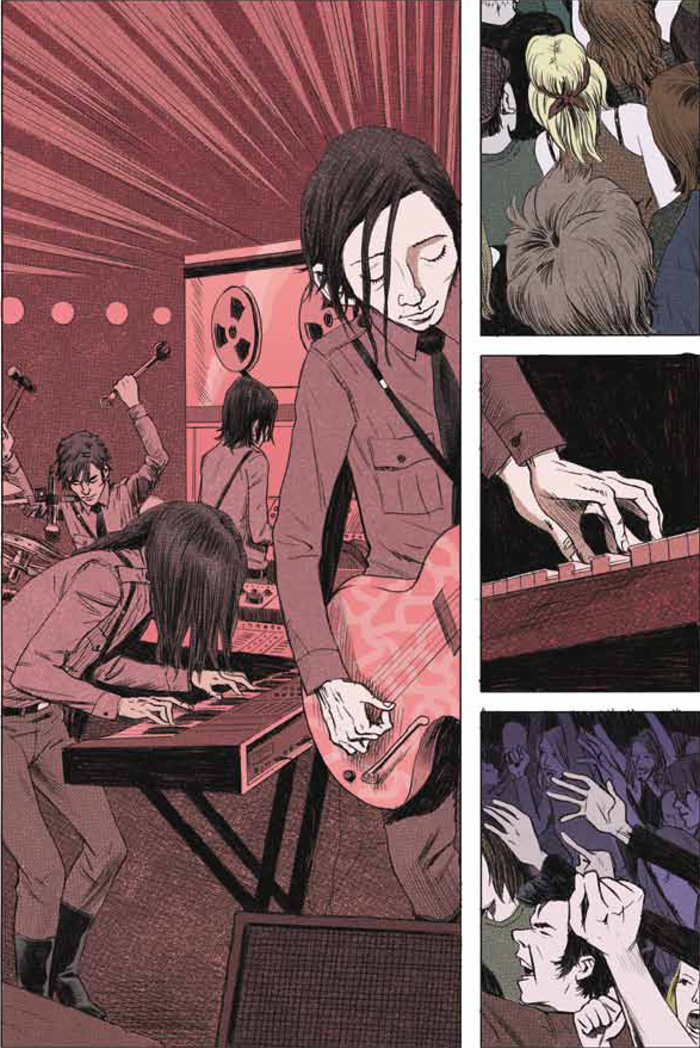
A central theme of the story – the main impetus, even – which the Dandy Warhols frontman discusses in his afterword, is the danger of the press changing and manipulating one’s words. One Model Nation are damned if they do, damned if they don’t, when it comes to severing any perceived ties to terrorism and asserting that they just want to play music. “The power of the press and the basic character types it attracts are similar to that same topic when applied to police," he says. "The injustice that both enjoy the benefits of is something that I couldn’t help but throw in there. One of many things that did once the story was in place and dudes are just sittin’ around talking.”
The comic, he says, “began as a story. I tried to adapt it to film but since I don’t know how to, I guess it ended up more like a play. I have read a lot of them whereas I had never read a film script before. Adapting to the book was mainly left to Joe Keatinge and Jim Rugg. I then edited their editing and tried to keep my part simple. I think this is my only story. I don’t know if I’ll ever need to tell another.”
Does he see any similarities between the creative processes of writing comics and making music? “I guess the language part is somewhat similar," he says, "but really for me music comes very natural or it isn’t worth putting time into, whereas writing whole stories front to back requires whole eternities of seemingly forced or unproductive labor. It really was a headfuck that one can’t see or comprehend the whole thing at once. That, coupled with it being a collection of still (images) but when you start reading it becomes time-based or real time, just made it hard for me to make objective decisions. I don’t know if I can explain that any more clearly.”
“I want all comics to be awesome," he continues, "so it’s more about what keeps me in rather than draws me to them. Usually confusion of character types and ham-fisted dialogue will drive me back out once I’ve opened up a new one. I really want to be taken away every time though. I find the real world to be mostly worrisome and difficult, so I need John Carter and Frodo and the Skywalkers.”
Courtney has also recorded an album by One Model Nation, Totalwerks Vol. 1, along with Donovan Leitch (with whom Courtney initially came up with the idea for the story), Elliot Barnes and Jon Fell (who coloured OMN). “We used a small and very modern digital recording setup but really had in mind this thing that was somehow 70s industrial and/or krautrock," he explains. "If things got too electronic or rave then I’d come in and put a microphone on a bicycle and start beating on it while the gears spun around. Voila. Vaguely 70s German industrial. I tend to just like certain songs from random bands of that era. If you want to check some out, look up Einstürzende Neubauten and a bunch of other stuff will come up with it. It’s definitely hit or miss with me but anything between that and Gary Numan was fair game when we needed some inspiration.”
